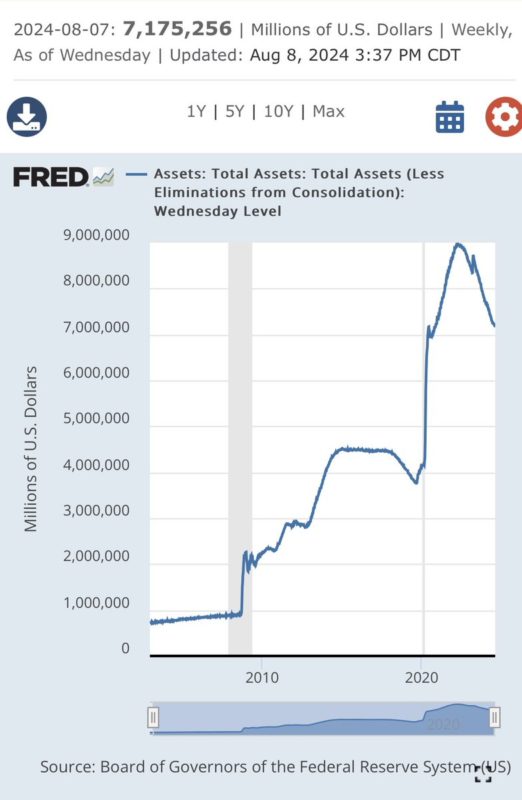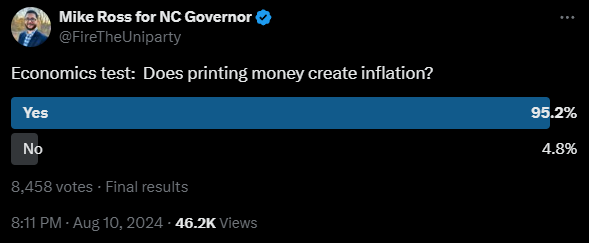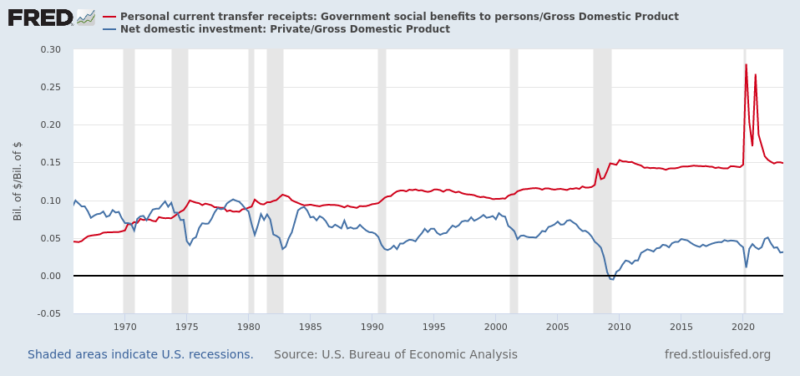Category Archive: 6b.) Mises.org
The American tradition of abolishing central banks
What is the Mises Institute?
The Mises Institute is a non-profit organization that exists to promote teaching and research in the Austrian School of economics, individual freedom, honest history, and international peace, in the tradition of Ludwig von Mises and Murray N. Rothbard. Non-political, non-partisan, and non-PC, we advocate a radical shift in the intellectual climate, away from statism and toward a private property...
Read More »
Read More »
Rachel Maddow’s hunt for imaginary fascists
What is the Mises Institute?
The Mises Institute is a non-profit organization that exists to promote teaching and research in the Austrian School of economics, individual freedom, honest history, and international peace, in the tradition of Ludwig von Mises and Murray N. Rothbard. Non-political, non-partisan, and non-PC, we advocate a radical shift in the intellectual climate, away from statism and toward a private property...
Read More »
Read More »
Is the European Union headed for another debt crisis?
What is the Mises Institute?
The Mises Institute is a non-profit organization that exists to promote teaching and research in the Austrian School of economics, individual freedom, honest history, and international peace, in the tradition of Ludwig von Mises and Murray N. Rothbard. Non-political, non-partisan, and non-PC, we advocate a radical shift in the intellectual climate, away from statism and toward a private property...
Read More »
Read More »
How should government police the public domain?
What is the Mises Institute?
The Mises Institute is a non-profit organization that exists to promote teaching and research in the Austrian School of economics, individual freedom, honest history, and international peace, in the tradition of Ludwig von Mises and Murray N. Rothbard. Non-political, non-partisan, and non-PC, we advocate a radical shift in the intellectual climate, away from statism and toward a private property...
Read More »
Read More »
A ‘smart city’ is a city plagued by high taxes and central planning
What is the Mises Institute?
The Mises Institute is a non-profit organization that exists to promote teaching and research in the Austrian School of economics, individual freedom, honest history, and international peace, in the tradition of Ludwig von Mises and Murray N. Rothbard. Non-political, non-partisan, and non-PC, we advocate a radical shift in the intellectual climate, away from statism and toward a private property...
Read More »
Read More »
Project 2025: The good, the bad, and the frustrating
What is the Mises Institute?
The Mises Institute is a non-profit organization that exists to promote teaching and research in the Austrian School of economics, individual freedom, honest history, and international peace, in the tradition of Ludwig von Mises and Murray N. Rothbard. Non-political, non-partisan, and non-PC, we advocate a radical shift in the intellectual climate, away from statism and toward a private property...
Read More »
Read More »
Bidenomics: New employment numbers say recession is here
What is the Mises Institute?
The Mises Institute is a non-profit organization that exists to promote teaching and research in the Austrian School of economics, individual freedom, honest history, and international peace, in the tradition of Ludwig von Mises and Murray N. Rothbard. Non-political, non-partisan, and non-PC, we advocate a radical shift in the intellectual climate, away from statism and toward a private property...
Read More »
Read More »
How capitalism defeats racism
What is the Mises Institute?
The Mises Institute is a non-profit organization that exists to promote teaching and research in the Austrian School of economics, individual freedom, honest history, and international peace, in the tradition of Ludwig von Mises and Murray N. Rothbard. Non-political, non-partisan, and non-PC, we advocate a radical shift in the intellectual climate, away from statism and toward a private property...
Read More »
Read More »
Musk Was Right in his Conversation with Trump
In their Space, Elon Musk spoke with Donald Trump about the cause of inflation being government overspending.Elon is right about this, that government fiscal and monetary policy causes inflation. So let’s do a walk through how deficit spending causes inflation:We first have to understand what inflation is. Inflation isn’t just prices going up, otherwise we are cornered into saying every supply shock or price increase is inflationaryInflation is an...
Read More »
Read More »
The Goose that laid the Golden Egg
Hello, and welcome to another episode of the “Minor Issues” podcast. I’m Mark Thornton at the Mises Institute.In this week’s episode, I’d like to talk about a brand-new paper of mine. It is on Ludwig von Mises and trade in general and international trade and protectionism. Trade, whether international or just across the street, is the great source of our standard of living. You can work 24 hours a day, but if you can’t trade with others, you would...
Read More »
Read More »
Tyranny in the UK – Can it Happen Here?
As the UK descends into tyranny, where just re-Tweeting something the government doesn’t like can land a person a multi-year jail sentence, Americans are wondering, “can it happen here?” After all, we have the guarantees of the First Amendment.But while we shake our heads at UK authorities jailing people for their social media posts this past week, we should not kid ourselves. The answer is that silencing dissent can happen here and it is happening...
Read More »
Read More »
Colonialism, Self-Determination, and Secession
What is the Mises Institute?
The Mises Institute is a non-profit organization that exists to promote teaching and research in the Austrian School of economics, individual freedom, honest history, and international peace, in the tradition of Ludwig von Mises and Murray N. Rothbard. Non-political, non-partisan, and non-PC, we advocate a radical shift in the intellectual climate, away from statism and toward a private property...
Read More »
Read More »
What Ludwig von Mises Meant by “Democracy”
“Democracy” is one of those terms that is essentially useless unless the one using the word first defines his terms. After all, the term “democratic” can mean anything from small-scale direct democracy to the mega-elections we see in today’s huge constitutional states. Among the modern social-democratic Left, the term often just means “something I like.” The meaning of the term can also vary significantly from time to time and from place to place....
Read More »
Read More »
Walter Williams and the Race Hustlers
In his book, Race & Economics: How Much Can Be Blamed on Discrimination? Walter Williams argues that socioeconomic outcomes are not determined by race.Williams’ argument has infuriated race hustlers — traders in identity politics — who promote the theory that all socioeconomic outcomes are determined by race. According to race hustlers, the only way for black people to advance is by seizing power and using it to wreak some form of revenge on...
Read More »
Read More »
Why Do We Work?
Socialists are obsessed with eliminating the need to work. They contend that it amounts to coercion that is oppressive. However, they fail to understand the implications of what it means to choose to work and why working is a necessary part of life.Working in the context of a job refers to exchanging labor for money. Most jobs work on a voluntary basis where an employer and employee agree upon the nature of the work and wages to be paid. Such an...
Read More »
Read More »
Does Printing Money Create Inflation?
The Libertarian Party candidate for governor of North Carolina posed this question on Twitter a few days ago:The question is poorly worded, but that is mainly the fault of the way the term “inflation” has fared in common parlance. Ross probably got the poll results he desired – he was trying to reinforce the idea that increasing the supply of money results in higher prices. The issue, however, is that those who understand that relationship are also...
Read More »
Read More »
Self-Determination, Imperialism, and Secession
This article is adapted from a lecture presented on August 3, 2024 at Mises University 2024 in Auburn, Alabama. The full name of this talk is “Self-Determination, Imperialism, and Secession: 3 Sides of the Same Coin.” So, I abuse the metaphor a bit, be we might also say that self-determination and secession—and self-determination’s opposite, imperialism—are three ways of looking at the same object.The defense of self-determination is...
Read More »
Read More »
Tax the Rich? Not a good idea
In the popular book “The Trading Game,” British author Gary Stevenson recounts his journey as a trader at a major U.S. bank in London. He has made lofty claims about his trading career and used it as a springboard for his successful YouTube channel, “Garys Economics.”A tailwind to his popularity is that he holds many fashionable views — for example, that money “is a token,” that printing money is akin to creating wealth, and that capitalism is the...
Read More »
Read More »
Presenting the moral case for capitalism
There is a widespread perception that capitalism is a system designed to encourage greed, envy, selfishness, and other moral failings to flourish. Popular writing on capitalism, notably Ayn Rand’s “The Fountainhead” and “Atlas Shrugged,” recognizes the importance of addressing the moral case for capitalism. No economic system, no matter how efficient and productive, can flourish if it is widely regarded as the root of all evil. Given that the...
Read More »
Read More »
Republicans declare war on the American economy
The 2024 Republican National Convention will be remembered for the raw emotions evoked by an attempted assassination the preceding weekend of its presidential nominee Donald Trump and for the now mostly Trumpified Republicans posing as the populist champions of American workers against the elitist Democrats.This convention, however, should be remembered for another reason too. It marks the entrenchment of an organized “national conservative”...
Read More »
Read More »






















